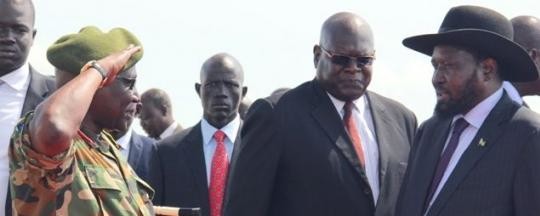South Sudan’s government SPLA fired shots at the United Nations base in Nasser, Upper Nile state, and has threatened to continue attacking the facility, a new report on ceasefire violations states.
The SPLA shot at the UN base because they believed rebels were sheltering inside, according to a report released today by the Intergovernmental Authority on Development (IGAD) which monitors violations of the cessation of hostilities signed more than a year ago by war leaders Salva Kiir and Riek Machar.
IGAD did not mention the exact date when SPLA shot at the base, but the new report covers incidents in the first two weeks of March.
After the shooting, on 12 March, the SPLA called a meeting with the UN and IGAD where army officers admitted to opening fire at the UN and threatened to continue attacking the compound as long as so-called opposition soldiers were inside.
Other UN bases in South Sudan have come under attack because some government officials have claimed that the unarmed displaced civilians sheltering inside are actually rebel soldiers. However, there are no displaced civilians sheltering in the Nasser base, according the spokesperson of the UN mission in South Sudan.
IGAD said that threats to fire at a UN base constitute a “clear violation” of the cessation of hostilities agreement.
Land mines
In the same 12 March meeting, an SPLA officer said his troops had planted land mines around Nasser town.
“A GRSS Forces Officer stated clearly that anti-personnel mines had been deployed in the area around Nasser,” IGAD said, adding that the SPLA has not responded to requests for further information about the land mines.
“The claim that [land mines] are being used by Government Forces constitutes a blatant disregard for not only the COHA [Cessation of Hostilities Agreement], but for international conventions,” IGAD said. “The use of anti-personnel mines would constitute a significant threat to the civilian population and an alarming escalation of the present conflict.”
IGAD urged its special envoys in Addis Ababa, Ethiopia to take “urgent and robust action” to demand that the government remove the land mines and punish the officers involved.
However, the IGAD report did not provide the names of the SPLA officers responsible for planting the land mines. The report also failed to name anyone in connection to the attack or threat on the UN base either.
Manyo offensive
IGAD’s report further confirmed allegations that the government went on the offensive in Manyo County, Upper Nile state in early March against the rebels to take Wadakona town.
On 7 March, the government attacked Wadakona from Kaka area, despite the fact that both sides had agreed that Wadakona would remain a “Special Arrangement Area” under control of Riek Machar’s SPLA-In Opposition.
“The advance into northern Manyo County and the deliberate capture of Wadakona by Government Forces constitutes a clear violation of the COHA,” IGAD said.
Rebel violations
The SPLA-IO also violated the cessation of hostilities agreement in the reporting period. On 5 March, the rebels shelled Duk Duk in Renk County alongside a “limited ground attack,” IGAD said. The next day, the rebels “initiated an exchange of indirect fire with government forces in Renk,” while on 7 March, they shelled Abukadra in the same county.
All of these actions were “clear violations” of the cessation of hostilities agreement, IGAD said.
Further, the rebels made an “incursion” with some 500 troops on 7 March toward Nasser town, which the two parties agreed would be a “Special Arrangement Area” under government control. IGAD did not say if shots were fired during that incursion or if the soldiers reached the town, but recommended that the special envoys issue a “warning” to the rebels over the aggressive action.
The full report is available below for download.




